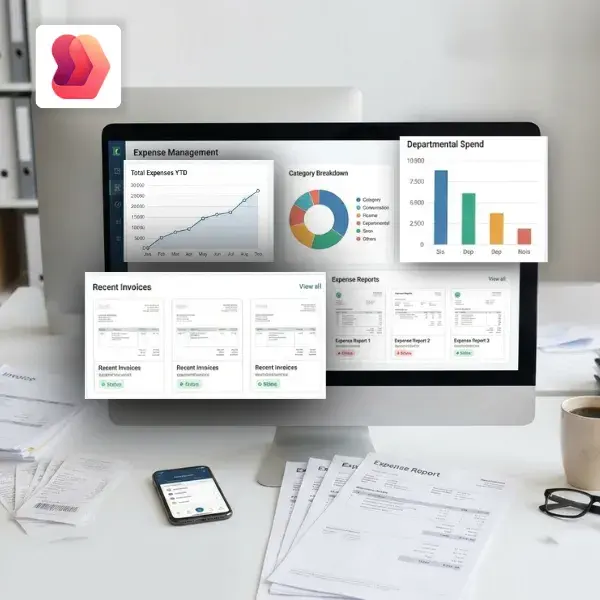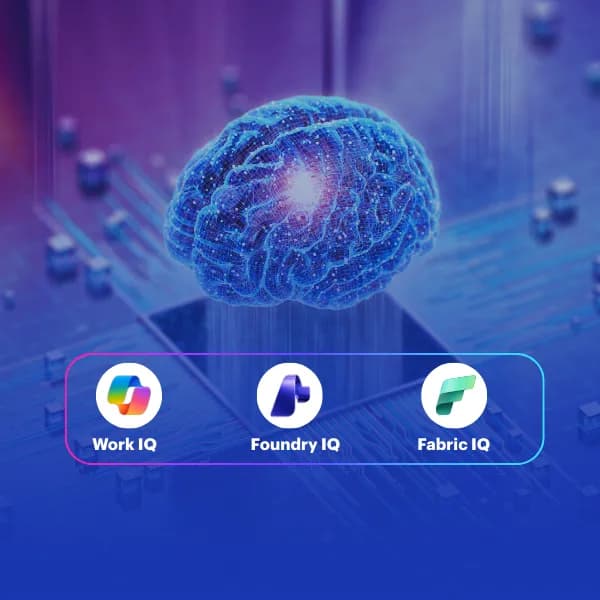The new generation of Enterprise Resource Planning (ERP) systems has been evolving at the intersection of artificial intelligence and cloud computing. And Microsoft is clearly leading this transformation. To many analysts in the ERP space, Microsoft appears to have (sort of) come from behind and taken a lead through its integrated ecosystem of Dynamics 365, Azure, and the Microsoft Copilots.
Many of us grew up knowing of ERPs as static systems of record. In the present age, however, ERPs have evolved into dynamic decision-support platforms capable not only of recording business transactions but also of providing predictive insights and increasingly supporting some autonomous operations. With Gartner forecasting that by 2027, 50% of ERP features will be powered by generative AI, forward-thinking organizations must prepare for this technological evolution. We explore here how Microsoft's AI-driven intelligence and cloud-based flexibility are redefining business applications. Business leaders must therefore prioritize modern ERP as a strategic asset for enhancing organizational agility, efficiency, innovation and competitiveness.
The Evolution of ERP: From On-Premise to SaaS
Even when the cloud adoption was on the rise, a vast percentage of business leaders and IT professionals remained glued to their belief that cloud was suitable for systems like CRM, but ERP systems would always remain on-premises. This belief stemmed from the idea that ERP systems encapsulated the unique competitive advantages businesses held, and therefore, business owners would never allow their ERP systems to be controlled by anyone else. Part of this belief also had its foundation in businesses thinking their data was more secure within their own premises. These on-prem ERP systems usually required large hardware investments and long implementation & stabilization period. The most common purpose for these monolith systems usually remained recording business transactions, financial accounting and inventory management. While revolutionary for their times, these systems remained rigid, hard to customize, and expensive to implement and maintain.
The first major shift came with the cloud revolution. Embracing Cloud (and SaaS) resulted in a massive transformation to the deployment model of Enterprise applications. The elimination of the need for on-premises hardware, together with subscription pricing, changed the rules of the game. Ensuring customer success with a successful ERP implementation became more important than a clever sale. This shift democratized access to enterprise-grade applications and introduced the concept of continuous updates - a big relief for enterprises which often experienced disruptions with every on-premise upgrade.
Most global players made the move to cloud within a short span of each other. This was a massive shift, and hence not everyone succeeded to the same degree. Microsoft’s success was amongst the most remarkable.
Today, we stand at the precipice of another transformative leap: the AI revolution. Microsoft has once again taken a big lead over the competition in powering the suite of its Business Applications – Dynamics 365, Power Platform, and in fact the entire Microsoft product line – with AI. Copilots represent the vanguard of this movement - enabling users significantly enhance their productivity and take automation to new frontiers. Microsoft Dynamics 365 Copilots have embedded generative AI capabilities directly into everyday business processes. Microsoft's unique advantage lies in its integrated approach—combining ERP, CRM, Power Platform, Azure AI services, and the Microsoft 365 productivity suite into a cohesive ecosystem that enhances every aspect of business operations. The natural cohesiveness of this suite of solutions – Business Applications & Modern Workplace – has triggered the latest merging of these practice lines in to a single practice (AI Apps) by Microsoft, amongst other structural changes underway.
AI-Infused Dynamics 365: From Reactive to Predictive Business Operations
Traditional ERP systems excelled at recording what happened but provided limited insight into what might happen next. Microsoft's AI-enhanced Dynamics 365 changes this paradigm by leveraging vast quantities of operational data to identify patterns, make predictions, and recommend optimal courses of action.
Consider these transformative capabilities now emerging in the Microsoft Business Applications ecosystem:
Predictive Analytics with Azure AI and Dynamics 365
Microsoft's integration of Azure Machine Learning with Dynamics 365 Finance and Supply Chain Management enables sophisticated demand forecasting that analyzes historical sales data, and seasonal trends. These insights enable more precise inventory management, reducing carrying costs while minimizing stockouts.
Financial Intelligence with Dynamics 365 Finance
Dynamics 365 Finance now incorporates machine learning models that continuously monitor financial transactions, learning normal patterns and flagging unusual activities that might indicate errors, fraud, or shifts in business conditions. Unlike rule-based systems, this AI-powered anomaly detection adapts to evolving business patterns, reducing false positives while catching sophisticated issues that might otherwise go undetected.
Process Automation with Power Automate and AI Builder
Microsoft's Power Platform extends the capabilities of Dynamics 365 with AI-enhanced process automation. For example, intelligent accounts payable systems can process invoices with varying formats using AI Builder's document intelligence, reconcile discrepancies against purchase orders in Dynamics 365, and route exceptions through Power Automate with contextual information about the issue. Custom configuration and workflows can be built to handle complex scenarios. This level of automation frees finance teams from mundane tasks while improving accuracy and control.
Copilot for Microsoft Dynamics 365
Microsoft Copilot for Dynamics 365 is revolutionizing how users interact with ERP systems. Rather than navigating complex menus and mastering specialized query languages, users can simply describe what they need in natural language. "Show me last quarter's sales performance for the Northeast region compared to target, broken down by product category" becomes a simple prompt rather than a complex reporting exercise. Copilot can also draft responses to customer inquiries, create email content, and generate meeting summaries, all contextually aware of your business data in Dynamics 365.
The Agent Revolution: Microsoft's Paradigm Shift in ERP
Perhaps the most significant advancement in Microsoft's business applications ecosystem is the introduction of intelligent agents within Dynamics 365. The 2025 release wave places AI agents at the center of Microsoft’s business applications strategy, highlighting them as a major innovation in Dynamics 365. Microsoft’s new agents are designed to move beyond traditional, user-driven ERP workflows. They proactively automate multi-step tasks, make contextual decisions, and can operate across departments with minimal human intervention. Agents are not just assistants; they can autonomously execute processes such as sales qualification, customer service case management, account reconciliation, and more. These agents are customizable and can span multiple business functions.
Microsoft Copilot Studio now allows organizations to build, customize, and deploy their own autonomous agents, further accelerating this shift. These agents are being rolled out across sales, service, finance, and supply chain. Agents integrate with existing workflows and data, leveraging the Microsoft Dataverse and Copilot Studio for extensibility and cross-functional automation.
The Transition to Autonomous Business Processes
Traditional ERP systems, including the ones with initial AI capabilities, have basically been tools that require human initiation and management. Microsoft's new agent technology in Dynamics 365 initiates enablement of transition from human to AI-based operations. These agents leverage a mix of sophisticated AI technologies like NLP, machine learning, and Gen AI to understand business context, make well-informed decisions, and take actions autonomously. And all this - within given organizational boundaries. While computer vision is not necessarily the top need in every agent scenario, it becomes crucial in scenarios where documents are being processed and automated.
The transition from tool-based, human-led ERP to autonomous, AI-led business processes is at the heart of Microsoft's 2025 release wave. This momentum is expected to get further strengthened over the next few years.
Microsoft's Agent Framework for Dynamics 365
Microsoft has created a highly advanced agent platform in Dynamics 365, and the Copilot Studio is the platform for developing, configuring, and deploying such agents. These agents bring together:
- Process Intelligence: to run and automate long, multi-step business processes independently, e.g. across sales, service, finance, and supply chain operations, cross-talk with multiple systems and departments, as reflected in cases like sales order management and customer service case handling.
- Contextual Awareness: With integration with Microsoft Graph and Dataverse, agents gain end-to-end visibility into business context. Microsoft Graph offers a single API for accessing organizational data, such as user, business, and operational context, which improves agents' situational awareness. Dataverse is the data backbone of Dynamics 365 and Power Platform, providing agents with access to current, cross-functional business data.
- Learning Capabilities: Agents learn over time through observing patterns and results of human as well as automated interactions.
- Governance Controls: Robust governance, where the agents function under specified security, compliance, and operational limits defined through organizational policies. Integration with Microsoft's identity, compliance, and security infrastructure ensures agents do not interfere with access controls and regulatory needs.
Agents Types
Microsoft's Dynamics 365 agent ecosystem includes the following types of agents:
- Process Agents: These manage end-to-end business processes like order-to-cash or procure-to-pay processes. For instance, a procurement agent might track inventory levels within Dynamics 365 Supply Chain Management, trigger purchase requisitions automatically when thresholds are met, analyze supplier choices based on historical performance metrics, and negotiate terms within specified boundaries—all with little human intervention.
- Assistant Agents: Acting in conjunction with human staff, these agents complement abilities by accessing information, generating communications, and offering real-time advice. For financial professionals, an assistant agent can offer real-time tax compliance guidance while processing transactions or notify users of potential regulatory concerns based on the most recent governance updates.
- Customer-Facing Agents: These agents deal with external interactions, attending to inquiries from customers, executing service requests, and overseeing transactions. In contrast to conventional chatbots, these advanced agents use Dynamics 365 Customer Service and Sales information to provide personalized interactions with profound comprehension of the history, tastes, and business situation of the customer.
- Orchestration Agents: Orchestration or "meta-agents" manage activity between multiple agents and human workers, providing seamless process flow between departments. For instance, an orchestration agent can handle sequence, dependencies, and escalation of activities during intricate processes such as month-end closing. The agents also have the ability to automate escalation and coordination, minimizing manual intervention.
Why Agents Represent a Compelling Evolution for ERP
The transition to agent-based ERP will deliver transformative benefits. Even though these transitions and the corresponding business benefits will take time to be fully realized by businesses, having the right platform adopted by the organization is the first step to a successful transformation. Some of these benefits would include:
- Unprecedented Business Agility: Agents will handle routine processes and will also learn continuously from outcomes. This will enable organizations to adapt to changing business conditions with minimal friction.
- True Process Optimization: Agents will not just execute predefined processes—they will also analyze patterns and outcomes to identify process improvement opportunities.
- Workforce Transformation: By automating not just routine tasks but complex processes requiring judgment, agents will increasingly free human talent to focus on strategic initiatives, relationship building, and innovation.
- Seamless Experience Across Systems: Agents are expected to operate across system boundaries, creating unified experiences. For example, an agent handling vendor onboarding can seamlessly move between Dynamics 365 Finance, Power Platform workflows, SharePoint document management, and external systems—presenting a cohesive process to both employees and vendors.
Microsoft Azure: The Foundation for Intelligent Business Applications
The AI revolution that Dynamics 365 is aiming to bring is powered by Microsoft Azure. Azure cloud architecture provides several foundational advantages to make this possible.
- Scalable Computing Resources: The ability to scale resources as needed is fundamental to running AI workloads – particularly those involving Machine Learning. These workloads require significant computational power, and the ability to scale as needed. Computationally intensive operations like financial closing, demand planning, and any large-scale data analysis need this flexibility.
- Connected Data Ecosystem with Dataverse and Fabric: The comprehensive connected data ecosystem provided by Microsoft Dataverse - the unified data platform underlying Dynamics 365, Power Platform, and Microsoft 365 provides AI systems with the context needed for meaningful insights. These capabilities can be extended with Microsoft Fabric - bringing together data integration, data engineering, and business intelligence into a unified SaaS offering that seamlessly connects with Dynamics 365.
- Enhanced Security with Microsoft Entra and Azure: With Microsoft Entra (formerly Azure AD) providing identity management and Azure's comprehensive security controls, organizations can deploy AI-enhanced business applications with confidence that sensitive business data remains protected.
The Path Forward: Getting Organizations Ready for Intelligent Business Applications
For organizations wanting to prepare for the next evolution of their enterprise applications several considerations will impact planning:
- Evaluate Current Microsoft Business Applications Maturity: Organizations still operating legacy on-premise Microsoft Dynamics solutions (AX, NAV, or GP) face a more significant transition than those already leveraging cloud-based Dynamics 365. Assess your current state to develop a realistic roadmap for modernization with a specific focus on agent readiness.
- Identify High-Value Agent Opportunities in Your Business Processes: While Microsoft's agent technology promises transformative, focus must initially be on processes with clear automation potential and business impact. Order processing in Commerce, purchase requisitioning in Supply Chain Management, and customer inquiry handling in Customer Service might provide quick wins that build momentum for broader agent adoption.
- Prepare Data Foundation for Intelligent Agents: Agent systems require high-quality, well-structured data to function effectively. This brings focus on data governance and data quality initiatives. Solutions like Microsoft Purview – a platform for unified data governance, security, and compliance - help organizations manage, protect, and maximize the value of their data across on-premises, multi-cloud, and SaaS environments. This ensures that the business agents have access to reliable information. Master Data Management needs particular attention as agents rely heavily on consistent entity definitions across systems.
- Develop an Agent-Ready Culture and Skill Set: The shift to agent-powered business applications will require new ways of working. Helping the work force to transition from process executors to process designers and agent supervisors requires training and change management. This is not going to be an easy transition. Creating a culture that views agents as digital colleagues rather than threats, requires paradigm shift.
Microsoft's Agent-Powered Business Applications as Strategic Assets
The convergence of AI and cloud computing is enabling Microsoft Dynamics 365 to push the boundaries of the traditional ERP. It’s becoming an intelligent, agent-driven operational platform – not just supporting business processes, but also actively driving them forward. While the last generation of ERP applications has remained focused on integrating business processes, the new-age ERP is going to fundamentally transform how work gets done. Focus will move from system implementations to deployment of digital workforce. And this will be a workforce that continuously learns, adapts and improves. Organizations adopting the new age solutions will continue to widen the gap in efficiency, adaptability, and innovation from those who don’t.
Forward-thinking executives must now envision Dynamics 365 not merely as a system of records or even a decision support platform, but as the foundation for an intelligent, autonomous enterprise where human talent focuses predominantly on strategic value creation while agents handle increasingly sophisticated operational execution.





